-
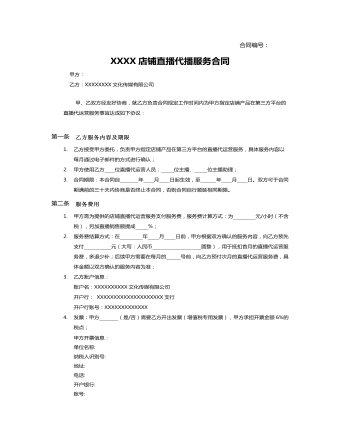
XXXX店铺直播代播服务合同
甲方: 乙方:XXXXXXXX文化传媒有限公司 甲、乙双方经友好协商,就乙方负责合同规定工作时间内为甲方指定店铺产品在第三方平台的直播代运营服务事宜达成如下协议:第一条 乙方服务内容及期限1. 乙方接受甲方委托,负责甲方指定店铺产品在第三方平台的直播代运营服务,具体服务内容以每月通过电子邮件的方式进行确认;2. 甲方使用乙方 位直播代运营人员: 位主播、 位主播助理;3. 合同期限:本合同自 年 月 日起生效,至 年 月 日。双方可于合同期满前的三十天内协商是否终止本合同,否则合同自行顺延相同期限。第二条 服务费用1. 甲方需为提供的店铺直播代运营服务支付服务费,服务费计算方式:为 元/小时(不含税),另加直播销售额提成 %; 2. 服务费结算方式:在 年 月 日前,甲方根据双方确认的服务内容,向乙方预先支付 元(大写:人民币 圆整),用于抵扣首月的直播代运营服务费,多退少补;后续甲方需要在每月的 号前,向乙方预付次月的直播代运营服务费,具体金额以双方确认的服务内容为准;3. 乙方账户信息:账户名:XXXXXXXXXX文化传媒有限公司 开户行: XXXXXXXXXXXXXXXXXXXX支行 开户行账号:XXXXXXXXXXXXX
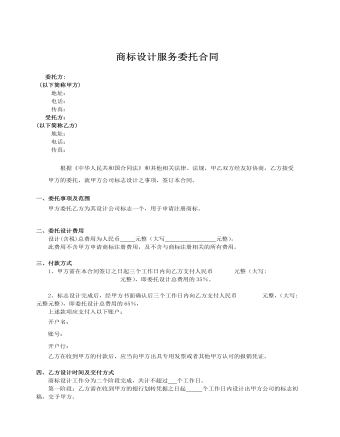
商标设计服务委托合同
根据《中华人民共和国合同法》和其他相关法律、法规,甲乙双方经友好协商,乙方接受甲方的委托,就甲方公司标志设计之事项,签订本合同。一、委托事项及范围甲方委托乙方为其设计公司标志一个,用于申请注册商标。二、委托设计费用设计(含税)总费用为人民币 元整(大写 元整)。此费用不含甲方申请商标注册费用,及不含与商标注册相关的所有费用。三、付款方式1、甲方需在本合同签订之日起三个工作日内向乙方支付人民币 元整(大写:元整),即委托设计总费用的35%。2、标志设计完成后,经甲方书面确认后三个工作日内向乙方支付人民币 元整,(大写: 元整元整),即委托设计总费用的65%,上述款项应支付入以下账户:开户名: 账号: 开户行: 乙方在收到甲方的付款后,应当向甲方出具专用发票或者其他甲方认可的报销凭证。四、乙方设计时间及交付方式商标设计工作分为二个阶段完成,共计不超过 个工作日。第一阶段:乙方需在收到甲方的银行划转凭据之日起 个工作日内设计出甲方公司的标志初稿,交予甲方。
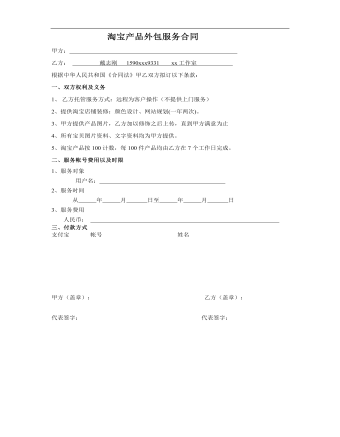
淘宝产品外包服务合同
甲方: 乙方: 戴志刚 1590xxx9331 xx工作室 根据中华人民共和国《合同法》甲乙双方拟订以下条款:一、双方权利及义务1、 乙方托管服务方式:远程为客户操作(不提供上门服务)2、提供淘宝店铺装修:颜色设计、网站规划(一年两次)。3、甲方提供产品图片,乙方加以修饰之后上传,直到甲方满意为止4、所有宝贝图片资料、文字资料均为甲方提供。
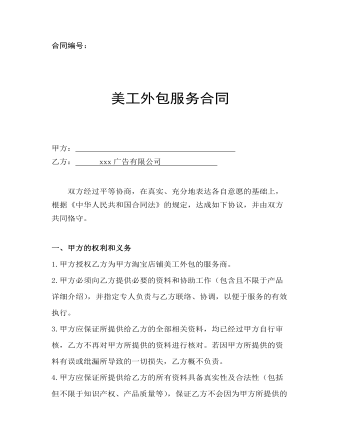
美工外包服务合同
双方经过平等协商,在真实、充分地表达各自意愿的基础上,根据《中华人民共和国合同法》的规定,达成如下协议,并由双方共同恪守。一、甲方的权利和义务1.甲方授权乙方为甲方淘宝店铺美工外包的服务商。2.甲方必须向乙方提供必要的资料和协助工作(包含且不限于产品详细介绍),并指定专人负责与乙方联络、协调,以便于服务的有效执行。3.甲方应保证所提供给乙方的全部相关资料,均已经过甲方自行审核,乙方不再对甲方所提供的资料进行核对。若因甲方所提供的资料有误或纰漏所导致的一切损失,乙方概不负责。4.甲方应保证所提供给乙方的所有资料具备真实性及合法性(包括但不限于知识产权、产品质量等),保证乙方不会因为甲方所提供的产品资料构成违法行为或对任何第三方产生侵权行为。5.甲方保证产品不侵犯任何第三方知识产权及品牌,凡因甲方违反此约定而给甲方自身及任何第三方带来经济损失或法律纠纷,乙方概不负责。6.甲方授权乙方服务期间内,甲方必须在本合同签订后支付给乙方全额服务费,作为本合同开始执行的条件。7.甲方必须根据本协议规定,按时足额向乙方支付服务费等款项。8.在甲方授权乙方服务期间内,甲方有权利向乙方提出设计要求,调整方案事项
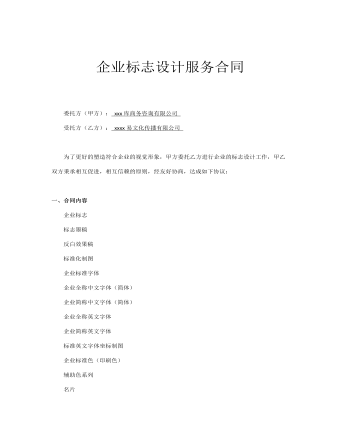
企业标志设计服务合同
为了更好的塑造符合企业的视觉形象,甲方委托乙方进行企业的标志设计工作,甲乙双方秉承相互促进,相互信赖的原则,经友好协商,达成如下协议:一、合同内容企业标志标志墨稿反白效果稿标准化制图企业标准字体企业全称中文字体(简体)企业简称中文字体(简体)企业全称英文字体企业简称英文字体标准英文字体坐标制图企业标准色(印刷色)辅助色系列 名片便签合同书封面手提袋形象墙名牌二、费用设计(不含税)总费用为人民币 10000 元(大写 壹万 元整)。 此费用不含甲方申请商标注册费用,及不含与商标注册相关的所有费用。 三、付款方式 1、本合同签订后,甲方向乙方支付合同总费用50%,即人民币 5000 元(大写: 伍仟 元整)作为预付款; 2、项目设计完成经甲方认可确认,甲方即向乙方支付合同余款,即人民币 5000 元(大写: 伍仟 元整)。乙方在收到款项的一个工作日内,向甲方提交电子文件光盘。 四、设计时间商标设计系统设计工作分为二个阶段完成,共 14 个工作日(不含甲方校稿时间)第一阶段:乙方收到甲方所支付预付款后 7 天,设计标志初稿交甲方认可。 第二阶段: 7 天,修改标志及完成应用设计。 五、双方的责任与义务甲方权利:1、甲方有权对乙方的设计提出建议和思路,以使乙方设计的设计更符合甲方企业文化内涵;2、甲方有权对乙方所设计的商标提出修改意见。
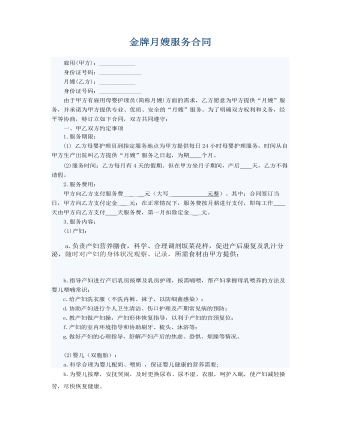
金牌月嫂服务合同
由于甲方有雇用母婴护理员(简称月嫂)方面的需求,乙方愿意为甲方提供“月嫂”服务,并承诺为甲方提供专业、优质、安全的“月嫂”服务。为了明确双方权利和义务,经平等协商,特订立如下合同,双方共同遵守:一、甲乙双方约定事项1.服务期限:(1) 乙方母婴护理员到指定服务地点为甲方提供每日24小时母婴护理服务,时间从自甲方生产出院叫乙方提供“月嫂”服务之日起,为期 个月。(2)服务时间:乙方每月有4天的假期。但在甲方坐月子期间,产后 天,乙方不得请假。2.服务费用:甲方向乙方支付服务费__ __ 元(大写_ 元整)。其中:合同签订当日,甲方向乙方支付定金_ _元;在正常情况下,服务费按月薪进行支付,即每工作 天由甲方向乙方支付 天服务费,第一月扣除定金_ _元。3.服务内容:(1)产妇:a.负责产妇营养膳食,科学、合理调剂饭菜花样,促进产后康复及乳汁分泌,随时对产妇的身体状况观察、记录,所需食材由甲方提供;
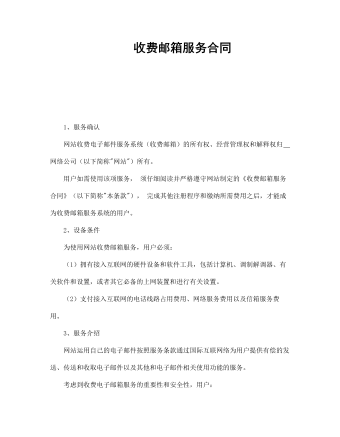
收费邮箱服务合同
1、服务确认网站收费电子邮件服务系统(收费邮箱)的所有权、经营管理权和解释权归 网络公司(以下简称"网站")所有。用户如需使用该项服务, 须仔细阅读并严格遵守网站制定的《收费邮箱服务合同》(以下简称"本条款"), 完成其他注册程序和缴纳所需费用之后,才能成为收费邮箱服务系统的用户。2、设备条件为使用网站收费邮箱服务,用户必须:(1)拥有接入互联网的硬件设备和软件工具,包括计算机、调制解调器、有关软件和设置,或者其它必备的上网装置和进行有关设置。(2)支付接入互联网的电话线路占用费用、网络服务费用以及信箱服务费用。3、服务介绍网站运用自己的电子邮件按照服务条款通过国际互联网络为用户提供有偿的发送、传送和收取电子邮件以及其他和电子邮件相关使用功能的服务。考虑到收费电子邮箱服务的重要性和安全性,用户:(1)在注册时,按照注册提示提供详尽、真实及准确的个人资料。
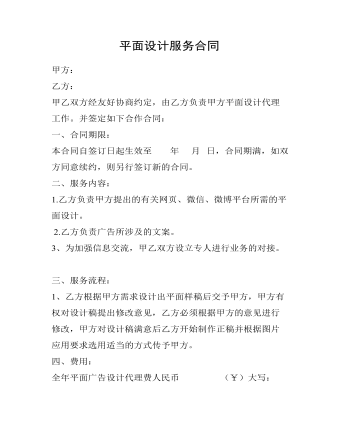
平面设计服务合同
甲乙双方经友好协商约定,由乙方负责甲方平面设计代理工作。并签定如下合作合同: 一、合同期限: 本合同自签订日起生效至 年 月 日,合同期满,如双方同意续约,则另行签订新的合同。 二、服务内容: 1.乙方负责甲方提出的有关网页、微信、微博平台所需的平面设计。2.乙方负责广告所涉及的文案。 3、为加强信息交流,甲乙双方设立专人进行业务的对接。 三、服务流程: 1、乙方根据甲方需求设计出平面样稿后交予甲方,甲方有权对设计稿提出修改意见,乙方必须根据甲方的意见进行修改,甲方对设计稿满意后乙方开始制作正稿并根据图片应用要求选用适当的方式传予甲方。
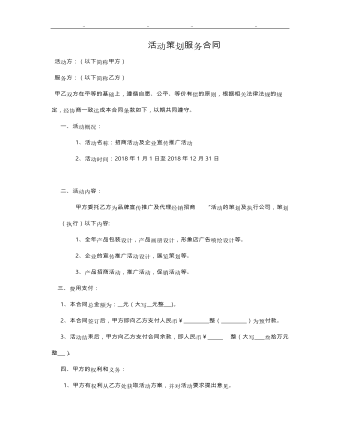
活动策划服务合同
甲乙双方在平等的基础上,遵循自愿、公平、等价有偿的原则,根据相关法律法规的规定,经协商一致达成本合同条款如下,以期共同遵守。 一、活动概况:1、活动名称:招商活动及企业宣传推广活动2、活动时间:2018年1月1日至2018年12月31日二、活动内容: 甲方委托乙方为品牌宣传推广及代理经销招商 ”活动的策划及执行公司,策划(执行)以下内容: 1、全年产品包装设计,产品画册设计,形象店广告喷绘设计等。2、企业的宣传推广活动设计,展览策划等。3、产品招商活动,推广活动,促销活动等。 三、费用支付: 1、本合同总金额为:__元(大写__元整___)。2、本合同签订后,甲方即向乙方支付人民币¥__________整(__________)为预付款。 3、活动结束后,甲方向乙方支付合同余款,即人民币¥______ 整(大写____叁拾万元整___)。
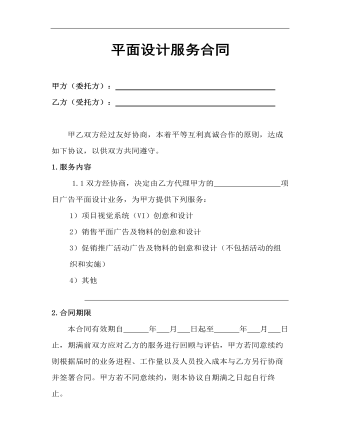
平面设计服务合同
甲乙双方经过友好协商,本着平等互利真诚合作的原则,达成如下协议,以供双方共同遵守。1.服务内容1.1双方经协商,决定由乙方代理甲方的 项目广告平面设计业务,为甲方提供下列服务:1)项目视觉系统(VI)创意和设计2)销售平面广告及物料的创意和设计3)促销推广活动广告及物料的创意和设计(不包括活动的组织和实施) 4)其他2.合同期限本合同有效期自 年 月 日起至 年 月 日止,期满前双方应对乙方的服务进行回顾与评估,甲方若同意续约则根据届时的业务进程、工作量以及人员投入成本与乙方另行协商并签署合同。甲方若不同意续约,则本协议自期满之日起自行终止。
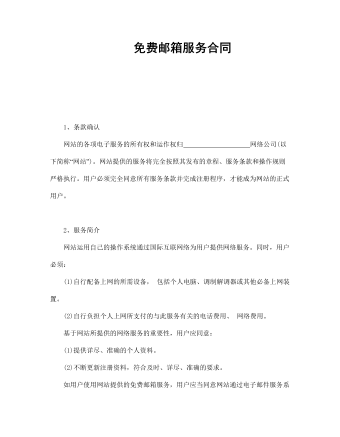
免费邮箱服务合同
1、条款确认网站的各项电子服务的所有权和运作权归 网络公司(以下简称“网站”)。网站提供的服务将完全按照其发布的章程、服务条款和操作规则严格执行。用户必须完全同意所有服务条款并完成注册程序,才能成为网站的正式用户。2、服务简介网站运用自己的操作系统通过国际互联网络为用户提供网络服务。同时,用户必须:(1)自行配备上网的所需设备, 包括个人电脑、调制解调器或其他必备上网装置。(2)自行负担个人上网所支付的与此服务有关的电话费用、 网络费用。基于网站所提供的网络服务的重要性,用户应同意:(1)提供详尽、准确的个人资料。(2)不断更新注册资料,符合及时、详尽、准确的要求。如用户使用网站提供的免费邮箱服务,用户应当同意网站通过电子邮件服务系统不定期为用户发送商品促销、打折或其他相关商业服务信息。
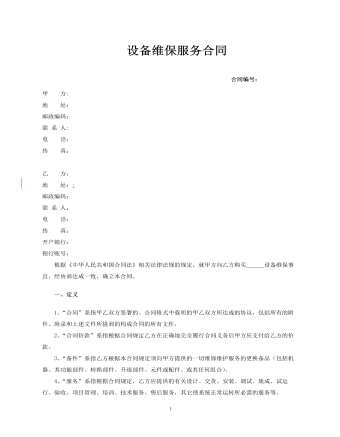
设备维保服务合同
一、定义1、“合同”系指甲乙双方签署的、合同格式中载明的甲乙双方所达成的协议,包括所有的附件、附录和上述文件所提到的构成合同的所有文件。2、“合同价款”系指根据合同规定乙方在正确地完全履行合同义务后甲方应支付给乙方的价款。3、“备件”系指乙方根据本合同规定须向甲方提供的一切维修维护服务的更换备品(包括机器、其功能部件、转换部件、升级部件、元件或配件、或其任何组合)。4、“服务”系指根据合同规定,乙方应提供的有关设计、交货、安装、调试、集成、试运行、验收、项目管理、培训、技术服务、售后服务,其它使系统正常运转所必需的服务等。5、“软件”指的是使得系统可以按照特定的方式进行运行或执行特定的操作的指令。6、“资料”指乙方在合同项下,向甲方提供的所有印刷或打印的文件,通过任何方式(包括声像或文本)和任何媒介向甲方提供的各种指令性和信息性的帮助,但不包括口头指导。7、“知识产权”指本合同涉及的任何及所有的著作权、商标权、专利权和其它智力成果的和专有的权利和利益。8、“甲方技术部门”是指代表甲方行使或履行合同中约定甲方技术部分权利义务的甲方内部职能部门。 9、除有特别说明外,“天”、“日”均指日历日。二、合同的组成以下文件是本协议不可分割的组成部分,如果不同文件的条款之间有冲突,文件之间的优先效力顺序如下:1、本合同及其附件;2、本项目招标文件;3、本项目投标文件。
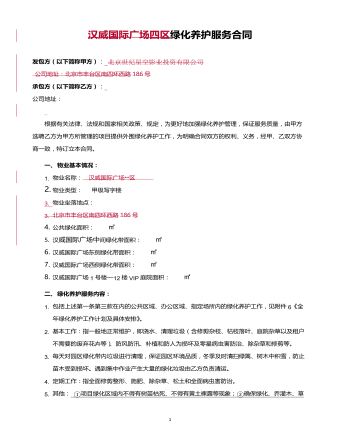
绿化养护服务合同
根据有关法律、法规和国家相关政策、规定,为更好地加强绿化养护管理,保证服务质量,由甲方选聘乙方为甲方所管理的项目提供外围绿化养护工作,为明确合同双方的权利、义务,经甲、乙双方协商一致,特订立本合同。一、 物业基本情况:1. 物业名称: 2. 物业类型: 甲级写字楼 3. 物业坐落地点:4. 公共绿化面积: ㎡5. 汉威国际广场中间绿化带面积: ㎡6. 汉威国际广场东侧绿化带面积: ㎡7. 汉威国际广场西侧绿化带面积: ㎡8. 汉威国际广场1号楼—12楼VIP庭院面积: ㎡二、 绿化养护服务内容: 1. 包括上述第一条第三款在内的公共区域、办公区域、指定场所内的绿化养护工作,见附件6《全年绿化养护工作计划及具体安排》。2. 基本工作:指一般地正常维护,即浇水、清理垃圾(含修剪杂枝、枯枝落叶、庭院杂草以及租户不需要的废弃花卉等)、防风防汛、补植和防人为损坏及零星病虫害防治、除杂草和修剪等。3. 每天对园区绿化带内垃圾进行清理,保证园区环境品质,冬季及时清扫绿篱、树木中积雪,防止苗木受到损坏。遇到集中作业产生大量的绿化垃圾由乙方负责清运。
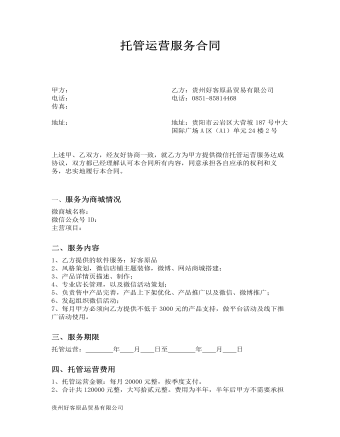
托管运营服务合同
上述甲、乙双方,经友好协商一致,就乙方为甲方提供微信托管运营服务达成协议,双方都已经理解认可本合同所有内容,同意承担各自应承的权利和义务,忠实地履行本合同。一、服务为商城情况微商城名称:微信公众号ID:主营项目:二、服务内容1、乙方提供的软件服务:好客原品2、风格策划,微信店铺主题装修,微博、网站商城搭建;3、产品详情页描述、制作;4、专业店长管理,以及微信活动策划;5、负责售中产品完善,产品上下架优化、产品推广以及微信、微博推广;6、发起组织微信活动;7、每月甲方必须向乙方提供不低于3000元的产品支持,做平台活动及线下推广活动使用。三、服务期限托管运营: 年 月 日至 年 月 日四、托管运营费用1、托管运营金额:每月20000元整,按季度支付。2、合计共120000元整,大写拾贰元整。费用为半年,半年后甲方不需要承担每月运营费用,第七个月乙方每月的保单数基数为200单,如完成200单甲方需要按10%的提点方式给予乙方(200以上也为10%,200单以下无提点)。
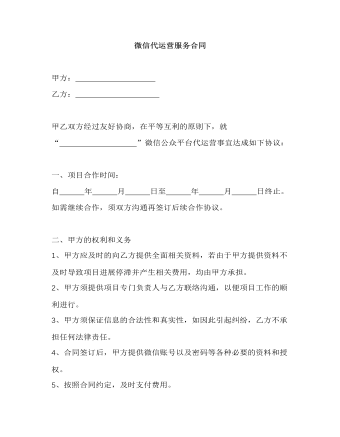
微信代运营服务合同
甲乙双方经过友好协商,在平等互利的原则下,就“ ”微信公众平台代运营事宜达成如下协议:一、项目合作时间:自 年 月 日至 年 月 日终止。如需继续合作,须双方沟通再签订后续合作协议。二、甲方的权利和义务1、甲方应及时的向乙方提供全面相关资料,若由于甲方提供资料不及时导致项目进展停滞并产生相关费用,均由甲方承担。2、甲方须提供项目专门负责人与乙方联络沟通,以便项目工作的顺利进行。3、甲方须保证信息的合法性和真实性,如因此引起纠纷,乙方不承担任何法律责任。4、合同签订后,甲方提供微信账号以及密码等各种必要的资料和授权。5、按照合同约定,及时支付费用。6、合作期间甲方不得授权相关业务给第三方单位。三、乙方的权利和义务1、乙方须提供项目专门负责人与乙方联络沟通,以便项目工作的顺利进行。2、按合同相关约定,为甲方提供合同内微信代运营服务。3、在合作期间,如未征得甲方同意,乙方不得擅自改变微信相关信息。4、在要求的期限内,完成合同规定项目,并通知甲方进行验收。5、合作期间乙方不得将甲方提供的资料传播、出售给第三方。四、费用结算及时间1、费用:本合同总计金额 元(¥ 元)(不含有关税费)。本合同签订当日,甲方支付乙方人民币 元整;项目完成经甲方确认后,甲方再支付乙方人民币 元整。
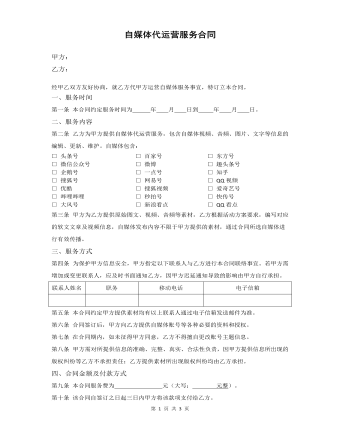
自媒体代运营服务合同
经甲乙双方友好协商,就乙方代甲方运营自媒体服务事宜,特订立本合同。一、服务时间第一条 本合同约定服务时间为 年 月 日到 年 月 日。二、服务内容第二条 乙方为甲方提供自媒体代运营服务,包含自媒体视频、音频、图片、文字等信息的编辑、更新、维护。自媒体包含:□ 头条号 □ 百家号 □ 东方号□ 微信公众号 □ 微博 □ 趣头条号□ 企鹅号 □ 一点号 □ 知乎□ 搜狐号 □ 网易号 □ QQ视频□ 优酷 □ 搜狐视频 □ 爱奇艺号□ 哔哩哔哩 □ 秒拍号 □ 快传号□ 大风号 □ 新浪看点 □ QQ看点第三条 甲方为乙方提供原始图文、视频、音频等素材,乙方根据活动方案要求,编写对应的软文文章及视频信息,自媒体发布内容不限于甲方提供的素材,通过合同所选自媒体进行有效传播。三、服务方式第四条 为保护甲方信息安全,甲方指定以下联系人与乙方进行本合同联络事宜。若甲方需增加或变更联系人,应及时书面通知乙方,因甲方迟延通知导致的影响由甲方自行承担。联系人姓名 职务 移动电话 电子信箱第五条 本合同约定甲方提供素材均有以上联系人通过电子信箱发送邮件为准。第六条 合同签订后,甲方向乙方提供自媒体账号等各种必要的资料和授权。第七条 在合同期内,如未征得甲方同意,乙方不得擅自更改账号主题信息。
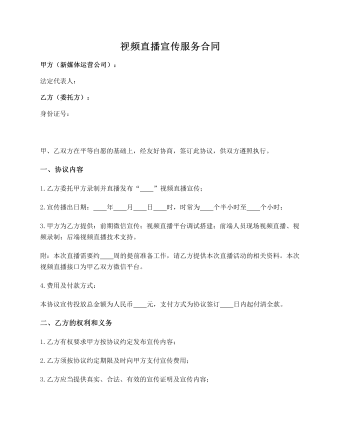
视频直播宣传服务合同
甲方(新媒体运营公司):法定代表人:乙方(委托方):身份证号:甲、乙双方在平等自愿的基础上,经友好协商,签订此协议,供双方遵照执行。一、协议内容1.乙方委托甲方录制并直播发布“ ”视频直播宣传;2.宣传播出日期: 年 月 日 时,时常为 个半小时至 个小时;3.甲方为乙方提供:前期微信宣传;视频直播平台调试搭建;前端人员现场视频直播、视频录制;后端视频直播技术支持。附:本次直播需要约 周的提前准备工作,请乙方提供本次直播活动的相关资料。本次视频直播接口为甲乙双方微信平台。4.费用及付款方式:
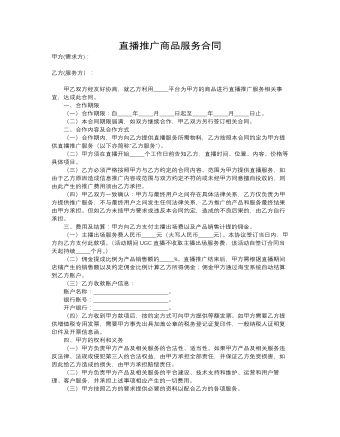
直播推广商品服务合同
甲乙双方经友好协商,就乙方利用 平台为甲方的商品进行直播推广服务相关事宜,达成此合同。一、合作期限(一)合作期限:自 年 月 日起至 年 月 日止。(二)本合同期限届满,如双方继续合作,甲乙双方另行签订相关合同。二、合作内容及合作方式(一)合作期内,甲方向乙方提供直播服务所需物料,乙方按照本合同约定为甲方提供直播推广服务(以下亦简称“乙方服务”)。(二)甲方须在直播开始 个工作日前告知乙方,直播时间、位置、内容、价格等具体项目。(三)乙方必须严格按照甲方与乙方约定的合同内容、范围为甲方提供直播服务,如由于乙方原因造成信息推广内容或范围与双方约定不符的或未经甲方同意擅自投放的,则由此产生的推广费用须由乙方承担。(四)甲乙双方一致确认:甲方与最终用户之间存在具体法律关系,乙方仅负责为甲方提供推广服务,不与最终用户之间发生任何法律关系,乙方推广的产品和服务最终结果由甲方承担。但如乙方未按甲方要求或违反本合同约定,造成的不良后果的,由乙方自行承担。三、费用及结算:甲方向乙方支付主播出场费以及产品销售计提的佣金。
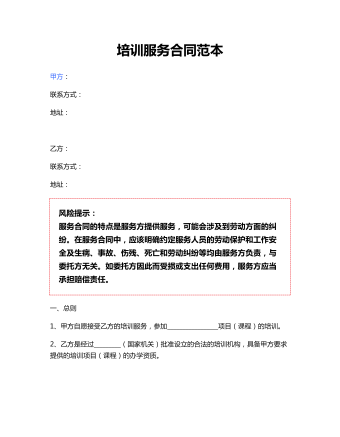
培训服务合同范本
一、总则1、甲方自愿接受乙方的培训服务,参加_________________项目(课程)的培训。2、乙方是经过_________(国家机关)批准设立的合法的培训机构,具备甲方要求提供的培训项目(课程)的办学资质。3、甲方已经对乙方提供的课程、师资、教材、学习时间、学习形式、结业成果形式、收费、退费等有关事项进行详细咨询,并表示认可;乙方也了解甲方参加培训的目的和要求。4、甲方缴费注册时,由甲、乙双方共同签订培训合同,作为双方今后解决争议纠纷的依据。二、甲方权利及义务1、甲方缴费项目及缴费金额(分项目填写,并注明是否包括考试费、证书成本费):_________元(大写__________________),缴费方式:__________________。2、自觉遵守学校规章制度,尊重学校教师和管理人员,对同学团结友爱,互相帮助。3、根据课程安排按时认真参加培训,因故不能参加培训提前请假。4、爱护学校物品,使用教学仪器设备应严格遵守操作规程。5、未经乙方同意,甲方不得复制、传播乙方提供的自编教材、讲义等学习资料,也不得在授课过程中擅自使用任何录音、录影设备。
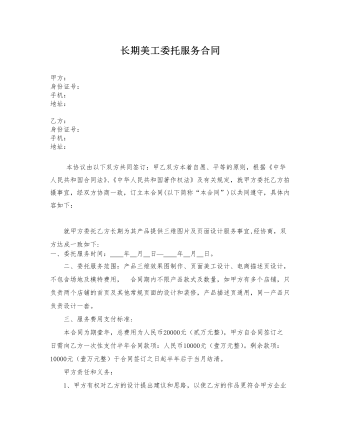
长期美工委托服务合同
本协议由以下双方共同签订:甲乙双方本着自愿、平等的原则,根据《中华人民共和国合同法》、《中华人民共和国著作权法》及有关规定,就甲方委托乙方拍摄事宜,经双方协商一致,订立本合同(以下简称“本合同”)以共同遵守,具体内容如下:就甲方委托乙方长期为其产品提供三维图片及页面设计服务事宜,经协商,双方达成一致如下:一、委托服务时间: 年 月 日— 年 月 日。二、委托服务范围:产品三维效果图制作、页面美工设计、电商描述页设计,不包含场地及模特费用, 合同期内不限产品款式及数量,如甲方有多个店铺,只负责两个店铺的首页及其他常规页面的设计和装修,产品描述页通用,同一产品只负责设计一套。三、服务费用支付标准:本合同为期壹年,总费用为人民币20000元(贰万元整),甲方自合同签订之日需向乙方一次性支付半年合同款项:人民币10000元(壹万元整)。剩余款项:10000元(壹万元整)于合同签订之日起半年后于当月结清。





















